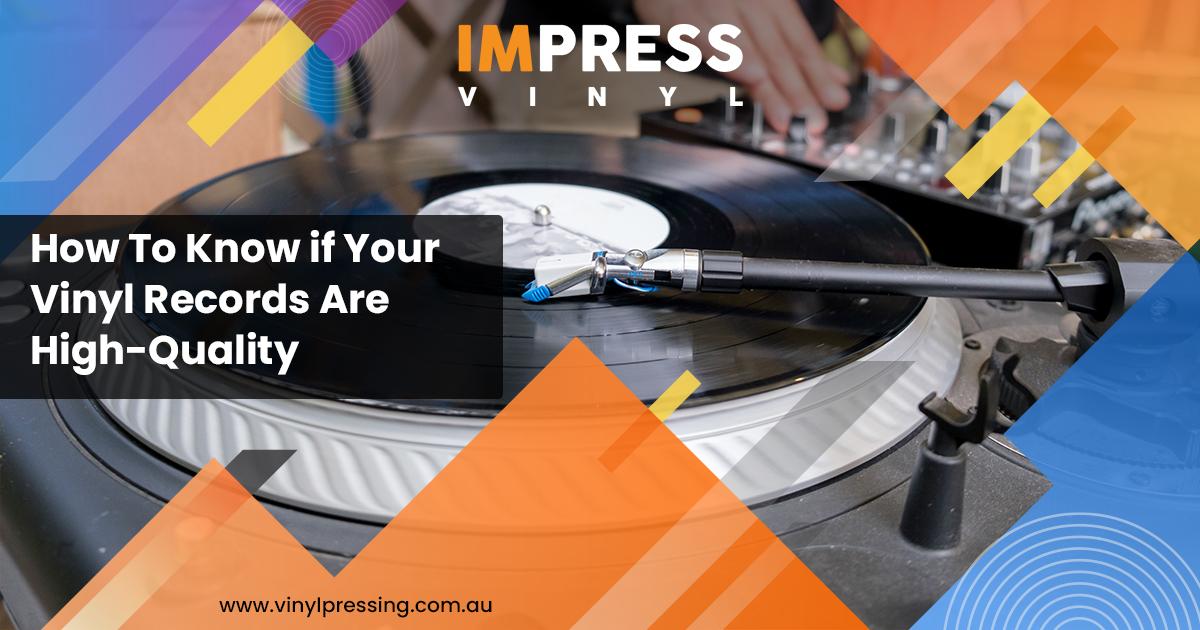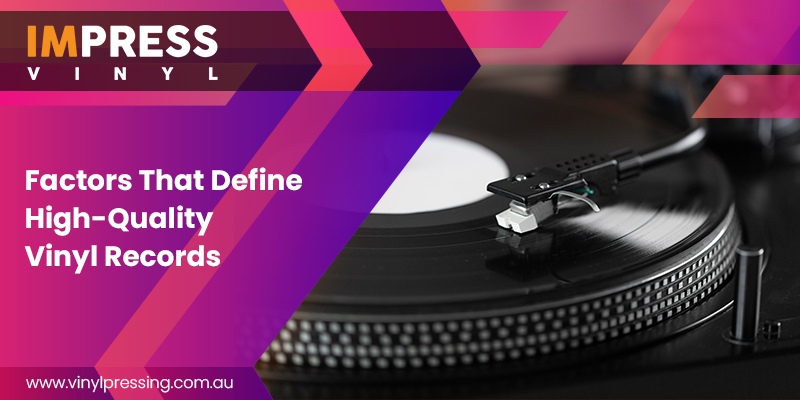How To Know if Your Vinyl Records Are High-Quality

Do you ever ponder why some vinyl records are clear as a bell while others sound like the surface of the moon? It is not uncommon to be confused about where to look for quality vinyl records, particularly for the new generation involved in custom vinyl records.
In this guide, you will learn what aspects you should focus on to get the most out of your vinyl records.
Understanding Vinyl Record Pressing
Vinyl record pressing plays a pivotal role in determining the quality of the final product. Custom vinyl records pressed with care and precision tend to offer better sound quality and longevity compared to hastily manufactured ones.
Mastering and Lacquering
The mastering and the lacquering are important in the preparation of the production of good quality vinyl records. The practice of well-mastered custom vinyl records is to ensure that the sound being imposed from the master of the record onto the vinyl is as clear as possible. Lacquering should be done meticulously to make this surface smooth and even so that it is easy to press on to make the gears.
Common Challenges in Identifying High-Quality Vinyl Records
These are some of the broadly defined common issues that may be faced while identifying high-quality Vinyl Records.
Misleading Packaging
In some cases, it reflects a tendency when the product’s packaging can mislead one. One important thing that a user can fail to notice is that the vinyl upon which the record has been produced must also be checked.
Counterfeit Records
Some disadvantages are specific to certain kinds of records, and fake records are always a concern for collectors. Buy from recognized stores and ensure the genuineness of the costly or uncommon records.
Surface Noise and Imperfections
Surface noise and imperfections seem to be a reality that cannot be escaped in the construction of any public works project. More to the point, scratchy and surface noise, pops, and clicks get in the way of the music. A high-quality vinyl record has minimal noise on the surface and is clean with no distortion, bumps, scratches, or bubbles. Check its records well under bright light to identify the defects that are present on the surface of the record.
Playback Issues
An additional challenge is consequently making sure that your turntable and your needle are well maintained clean and in good condition as even good records can sound poor with a low-quality turntable and needle. Records and stylus should be cleaned often to produce the best sound.
What Makes a Vinyl Record High-Quality?
Vinyl Material and Weight
It should be noted that high-quality vinyl records generally come from virgin vinyl that does not contain any contaminants. It makes the appearance of this material cleaner as compared to the recycled vinyl. Also, there is a bit of relevance to the weight of the vinyl in this regard. The records made of heavier materials like 180-gram vinyl have proved to be more resilient and have good sound quality.
Accuracy in Records Pressing
The process of vinyl record pressing greatly impacts the final product. High-quality records are produced with a lot of precision to the details. The grooves have to be perfectly straight and very well done so as not to have any distortions. Such vinyl records produced by credible companies usually undergo some form of scrutinization to see that they get the best.
Mastering Quality
Mastering plays an important role in the final quality of a viscous disc because it defines its tone. There are high-fidelity records that are cut specifically for the vinyl format to enhance it and take into concern its properties. Try to find tracks with notes on their mastering as ‘mastered for vinyl’ or ‘audiophile quality’.
Groove depth and Width
The grooves on a vinyl record hold the relevant information that creates the audio output. Better quality of vinyl records means increased grooves’ depth and width so that the needles fit in better and the sound is of better quality. Grooves that are not very deep or very close together cause a reduction in sound quality and rapid wear of the record.
Factors That Define High-Quality Vinyl Records
In general, it is a rather difficult thing to do for a person, especially if you are a beginner in the field of vinyl records to draw any conclusions about the quality of the records. Here are some key factors to consider when assessing the quality of your vinyl records:

Vinyl Record Pressing Techniques
In general, it would be rather limited to state that the quality of this vinyl record partly depends on the pressing of this material. High-quality vinyl records are typically pressed using meticulous techniques that involve:
-
Virgin Vinyl:
As for vinyl records, one should look for the ones made out of pure vinyl, which means no reuse materials are used in them to enhance the sound quality of the record and its sturdiness.
-
Precision in Pressing:
These noises are not found on music records that are pressed closely and with a lot of details and will have a wider dynamic range.
-
Thickness and Weight:
High-quality vinyl records are normally thicker. Normal record often, record weight is normally around 120 grams, whereas the high-quality vinyl record varies between 140 to 180 grams. Thicker vinyl as they pledged good soundproofing and least distorting of the flooring.
-
Surface Smoothness:
Run your finger gently across the record’s surface. A good vinyl record should not have large lumps or raised ridges that can be felt or seen when touching the record. Regarding the shortcomings, some may also affect the sound quality and track issues on the turntable.
-
Center Hole Alignment:
The center hole should be in the right place. Uncentered records may produce side-to-side movements or wobble which is not positive to the quality of sound produced.
Visual Inspection
Visual cues can also indicate the quality of a vinyl record:
Visual Cues of High-Quality Vinyl Records:
-
Glossy Finish:
Glossy generally is taken to mean that the record has been pressed well and one can barely hear the surface noise. Matte finishes or visible marks may suggest a lower-quality pressing.
-
Feel the Edges:
Run your fingers down the edges of the record like how one draws the circumference of a circle. The edges must be smooth and they should not be aggressive in any way also they should not be sharp in any form.
-
Label Alignment:
Check also if the record label passes through the middle of the groove and if it is centrally positioned. Incorrect placement of labels alters the positions of balance it also interferes with the sound and the appearance of the item.
Sound quality and Testing
Ultimately, the sound quality is the ultimate test of a vinyl record’s quality. Here’s how you can assess it:
-
Background Noise:
High-quality records allow little to no background noise when the records are played back. Look for pops, clicks, or hisses on the record that can suggest the quality of the pressing that was done.
-
Dynamic Range:
A vinyl record that has been pressed well will have a good and clear recording of high as well as low frequencies without any distortion.
-
Tracking Performance:
Make sure that the cartridge as well as the stylus of your turntable are aligned and set to the right specifications. Problems with the groove like the lack of circumference or too much bouncing of the needle can tell a subpar pressing of the record.
Custom Vinyl Records- A Great Option
Custom vinyl records offer a unique opportunity to own high-quality vinyl tailored to your preferences. The production of custom records can suit musicians planning to press their albums. Besides providing top-notch sound quality, customized records are also good for collectors.
Benefits of Custom Vinyl Records
-
Control Over Quality:
This is a big advantage when ordering custom vinyl records because one gets to find the best materials in the market and the pressing plants.
-
Unique Artwork:
Custom records involve unique artwork and packaging of the records as well, which thus, makes them very exquisite pieces to own.
-
Special Features:
It comes with several features that can range from colored vinyl finish to customized etching on the records, making the product even more valuable.
Get High-Quality Vinyl Records at Impress Vinyl
Impress Vinyl aims at developing custom vinyl records that would not only sound great but also look excellent. Our meticulous vinyl record pressing process ensures that all of the records that are manufactured are of the finest quality. Right from the choice of the vinyl to the way we master and press the discs, we ensure every custom vinyl record yields the best possible sound quality.
Our services include:
- A component of the turntable is made from 100 % pure virgin vinyl to enhance sound quality.
- Heavyweight vinyl options for enhanced durability.
- High-quality mastering and lacquering processes.
- Good carrier and a protective material to safeguard your records.
Take Your Record Collection up a Notch with Superior Quality Records
By understanding the key factors that encompass high-quality vinyl records, one can make the right choices when sourcing turntables, vinyl record pressing, or even maintaining the good sound quality of the records. Whether you’re investing in new additions to your collection or creating custom vinyl records, quality should always be your top priority.
Ready to upgrade your vinyl collection? Discover the exceptional quality and craftsmanship of Impress Vinyl’s custom vinyl records. Contact us today to learn more about our services and how we can help you create the perfect vinyl record.